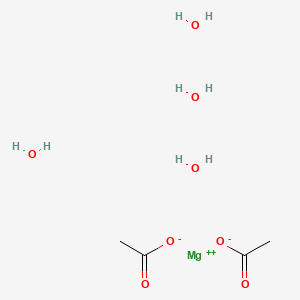



1. 16674-78-5
2. Magnesium;diacetate;tetrahydrate
3. Magnesiumacetatetetrahydrate
4. Mfcd00149214
5. Magnesium Diacetate Tetrahydrate
6. Acetic Acid, Magnesium Salt, Tetrahydrate
7. I01g0ejc3b
8. Magnesium Diacetate Tetrahydrate; Magnesium(2+) Acetate Tetrahydrate
9. Magnesium Diethanoate Tetrahydrate
10. Unii-i01g0ejc3b
11. Magnesium Acetate Tetra Hydrate
12. Chembl3989858
13. Dtxsid60168170
14. Akos022185858
15. Db09409
16. Magnesium Acetate Tetrahydrate Acs Grade
17. Magnesium Acetate Tetrahydrate [mi]
18. Ft-0628071
19. Magnesium Acetate Tetrahydrate [vandf]
20. Magnesium Acetate Tetrahydrate, Puratronic(r)
21. Magnesium Acetate Tetrahydrate [who-dd]
22. Magnesium Acetate (mg(oac)2) Tetrahydrate
23. J-010308
24. Magnesium Acetate Tetrahydrate [ep Monograph]
25. Magnesium Acetate Tetrahydrate [orange Book]
26. Q27280179
27. Acetic Acid, Magnesium Salt, Hydrate (2:1:4)
28. Magnesium Acetate Tetrahydrate, Molecular Biology Grade
29. Magnesium Acetate Tetrahydrate, Trace Metals Grade 99.95%
| Molecular Weight | 214.45 g/mol |
|---|---|
| Molecular Formula | C4H14MgO8 |
| Hydrogen Bond Donor Count | 4 |
| Hydrogen Bond Acceptor Count | 8 |
| Rotatable Bond Count | 0 |
| Exact Mass | 214.0539091 g/mol |
| Monoisotopic Mass | 214.0539091 g/mol |
| Topological Polar Surface Area | 84.3 Ų |
| Heavy Atom Count | 13 |
| Formal Charge | 0 |
| Complexity | 25.5 |
| Isotope Atom Count | 0 |
| Defined Atom Stereocenter Count | 0 |
| Undefined Atom Stereocenter Count | 0 |
| Defined Bond Stereocenter Count | 0 |
| Undefined Bond Stereocenter Count | 0 |
| Covalently Bonded Unit Count | 7 |
Used as magnesium salf-containing laxatives to prevent constipation. It can bring synergistic effect to restore normal bowel function when using in combination with aluminum salts that induce bowel retention. Magnesium acetate tetrahydrate is used as a source of water and electrolytes when combined with dextrose and other salts to form intravenous infusions. This injection can be used for patients with carbohydrate or magnesium deficiency, insulin hypoglycemia, constipation or hypertension during pregnancy.
Magnesium is an essential cofactor for many enzymatic reactions such as protein synthesis and ATP production. It also participates in adenylyl cyclase pathway and tyrosine kinase signalling pathways. Magnesium may also play a role in regulating glucose metabolism. It serves as an essential cation for a number of biochemical processes involved in nerve signaling, bone mineralization and muscle contractions.
Absorption
Intestinal absorption is achieved mainly through passive diffusion.
Route of Elimination
Mainly renal exctretion, where up to 97% of magnesium may be excreted renally during hypermagnesemia.
Volume of Distribution
Magnesium ions display approximate volume of distribution of 0.2 to 0.4 L/kg
Elimination half-life has been reported to be 27.7 hours following an overdose of 400mEq magnesium in an adult.
Magnesium ions electrostatically stabilize the adenylyl cyclase complex and enhance its catalytic actions and production of cAMP. They also regulate the level of phosphorylation in various pathways by formation of transition state of phosphoryl transfer reaction by protein kinases and stabilize ATP binding to protein kinases via electrostatic interactions. Many metabolic enzymes involved in glycolysis and Krebs cycle are magnesium-dependent. Magnesium-containing laxatives cause diarrhea through water retention and increased fecal mass that stimulates peristalsis. When used as an electrolyte supplementation, magnesium acetate tetrahydrate induces diuresis and metabolic alkalinizing effect. Magnesium ions enhance reactivity of arteries to vasoconstrictors, promotes vasoconstriction, and increases peripheral resistance, leading to increased blood pressure through potential competition with calcium ions in the vascular system. Magnesium ions also regulate other ions entering and exiting the cell membrane by acting as a ligand in N-methyl-D-aspartate receptor.
